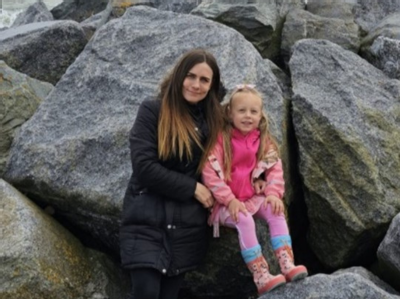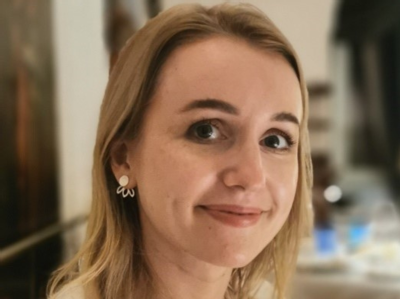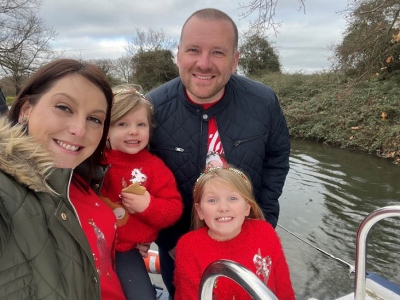Coeliac Stories
The reality for too many people across the UK with coeliac disease is that the food that keeps them well is too expensive and hard to access. Meet our amazing case studies, who have bravely come forward to share their stories on how they have been affected by the cost of living crisis.
Andrew Bloodworth, 42, Stamford
 Andrew Bloodworth, 42 from Stamford in Lincolnshire, works as an optical assistant and provides for three children at home. He was diagnosed with coeliac disease just after his 40th birthday and initially struggled to live with the condition due to the high costs of gluten free food.
Andrew Bloodworth, 42 from Stamford in Lincolnshire, works as an optical assistant and provides for three children at home. He was diagnosed with coeliac disease just after his 40th birthday and initially struggled to live with the condition due to the high costs of gluten free food.
Andrew needs to follow a strict gluten free diet to avoid the debilitating symptoms of coeliac disease, a serious autoimmune condition where the body’s immune system reacts to gluten and attacks the gut. It affects one in 100 people and currently the only treatment is to follow a strict gluten free diet for life.
The cost of gluten free food means Andrew sometimes felt forced to consume gluten and suffer the consequences. When Andrew consumes gluten, he experiences a range of gut-related health issues which cause him considerable discomfort.
Andrew said: “Whenever I eat gluten, the pain in my stomach can be unbearable. I’ll experience severe stomach cramps and diarrhoea which makes the day a complete write-off. It has been a struggle sticking to the diet I need as non-gluten containing alternatives are so expensive compared to food containing gluten.
“In the past I always prioritised my children and made sure there was food on their plate before justifying the extra spend on gluten free food, which means that I knowingly ate food containing gluten. Things are better now thanks to accessing gluten free prescriptions.”
Andrew lives in an area which provides gluten free bread and flour on prescription. This provides Andrew with bread on repeat prescriptions. Having access to prescriptions has significantly improved Andrews quality of life.
“Being able to receive gluten free bread on prescription is a game changer. I can now spend more money on food for my children, as well as enjoy a more varied and balanced diet which is now strictly gluten free. It’s a relief no longer having to endure gut issues and it’s a weight off my shoulders having this support with food bills. The prescriptions have been a fantastic safety net and a way of sticking to a gluten free diet – I couldn’t imagine living without this lifeline now.
“The only treatment for coeliac disease is a strict gluten free diet, and if you’re unable to afford the expensive gluten free foods, difficult decisions have to be made which have such a big impact on health. I’d urge anyone struggling to afford gluten free food to check if you live in an area which provides these prescriptions, and I hope to see gluten free prescriptions across the UK. It’s been so important to me, and I’d never want to see anyone else needing to make the difficult decisions I had to make.”
Andrew is working with Coeliac UK to help spread the word about coeliac disease and is passionate about supporting its campaign to make gluten free food more affordable and more accessible.
Hannah English, 34, Ipswich
 Hannah English, 34 from Ipswich, is the mother of a five-year-old daughter, Harper, who has coeliac disease.
Hannah English, 34 from Ipswich, is the mother of a five-year-old daughter, Harper, who has coeliac disease.
Harper was diagnosed with coeliac disease the day after her third birthday.
Before the diagnosis, Harper experienced consistently loose, unpleasant stools and a frequently bloated stomach. Post-diagnosis, if Harper consumes gluten, she becomes violently ill for a few days.
Hannah said: “I feel guilty even now, thinking that she must have been in pain for a long time but was unable to express this to me due to being so little. Harper has been on a gluten free diet for over two years now. It was a very hard and emotional time trying to get a diagnosis. I was told not to worry and that it was nothing, but I knew something wasn’t quite right – it was a mother’s instinct.”
Adapting to a gluten free lifestyle for Harper has brought daily challenges due to limited affordable options and the cost of gluten free items being significantly higher than gluten containing counterparts. This has been exacerbated by the cost of living crisis.
“It’s been difficult, but we must cater for Harper’s health needs, no matter the cost.”
To manage expenses, Hannah has turned to online shopping, allowing her to track purchases and check every ingredient from home. “We have allocated a budget to our weekly shopping as it can be extortionate. I do online shopping so I can add up the cost as I go along and check every single ingredient. If I were to go into the shop to read every single ingredient, it would take much longer, especially with the children. This way, I can do it in the evening and collect the shopping when needed. Although it is never as easy as that."
Despite these efforts, challenges remain. "On every shopping order, there will be items not available or unsuitable substitutions, so I will have to go to multiple shops to ensure that I have what my daughter needs for the week. There’s definitely a lack of choice of substitutions for gluten free foods in general.”
Hannah is working with Coeliac UK to help spread the word about coeliac disease and is passionate about supporting its campaign to make gluten free food more affordable and more accessible.
Hannah Meakin, 31, Cambridge
 Hannah Meakin, 31 from Cambridge, works as a Specialist Audiologist at a hearing implant centre in the NHS.
Hannah Meakin, 31 from Cambridge, works as a Specialist Audiologist at a hearing implant centre in the NHS.
Hannah was diagnosed with coeliac disease at the age of 14. Before diagnosis, Hannah suffered from stomach cramps, bloating and nausea impacting her school attendance.
Hannah said: “There were concerns that I was making up my symptoms because I was struggling a bit with my mental health. I was very underweight and not growing at the same rate as my school friends. Luckily, my mum believed me when I told her that I felt sick all the time. My symptoms when I ate gluten included stomach cramps, fatigue, brain fog, migraines, and vomiting.”
Hannah’s GP recommended a blood test, leading to a positive coeliac disease diagnosis confirmed by biopsy.
Hannah recalls the day she was diagnosed with coeliac disease at the age of 14: “I can’t believe I had been poisoning myself for such a long time, but you are so young that you don’t know what is wrong with you and you don’t have the tools to work out what the issue is at that age.”
Adjusting to a gluten free lifestyle brought daily mealtime challenges, with limited affordable options. Hannah often finds she is eating less food than she should be as she’s conscious not to overspend, and with the added pressure of the cost of living crisis, this has added to the challenges of needing to live gluten free.
“Whenever I do a food shop, there is a feeling of anxiety that I would have overspent on what I deem as basics for the week.
“As an NHS worker with demanding hours, I often need to have some gluten free food available for my short lunch breaks. This necessity can be challenging to fulfill both in terms of accessibility and affordability. Staples like gluten free bread are crucial for quickly assembling a nutritious meal, yet they are often hard to come by at a reasonable price. As a result, I sometimes end up with a less nutritious meal, which is far from ideal given the physical and mental demands of my job.”
Hannah also has to go to a variety of supermarkets to get everything that she needs.
“I am often going to a mix of supermarkets to find food. It can be very stressful when I am staying somewhere new to know where you can source food without risk to my health.”
Hannah is working with Coeliac UK to help spread the word about coeliac disease and is passionate about supporting its campaign to make gluten free food more affordable and more accessible.
The Powell family, Waterlooville, Hampshire
 Kate Powell, 37 from Waterlooville in Hampshire is a mother of two young girls with coeliac disease. Kate and her husband, Simon aged 39, both work full-time to financially support the family and fund a gluten free diet.
Kate Powell, 37 from Waterlooville in Hampshire is a mother of two young girls with coeliac disease. Kate and her husband, Simon aged 39, both work full-time to financially support the family and fund a gluten free diet.
Ella, aged seven, and Amelia, aged four, both follow strict gluten free diets which is the only treatment for those with coeliac disease.
Kate said: “Amelia became a different toddler when she turned two. Her complexion was very pale and grey, her stomach bloated, she was randomly vomiting, and her whole demeanour changed. She had no energy and no longer wanted to play. It’s upsetting to see photos of how much she had changed. Following her diagnosis, and now on a gluten free diet, she is back to her normal, happy self which is a huge relief.”
Kate and Simon find the family’s weekly shop expensive. This financial burden has been made worse by the Hampshire and Isle of Wight Integrated Care Board withdrawing gluten free prescriptions. The family used to access gluten free staples on prescription, but this lifeline was removed for them at the start of the year, and the family are now facing an extra £15 cost to their weekly shop.
Kate said: “Anything in the free from aisle is really expensive. Prescriptions were a vital lifeline before they were removed, and we’re now spending an extra £15 on average on our weekly shop because of it. We’ve tried to cut down on food like bread, but it’s still had a big impact on us as a family.”
“Time is precious and we try to balance work, housework, cooking, and family time so we can make as many precious memories as possible. Eating gluten free takes up a surprising amount of time. Shopping takes twice as long as we’ll typically need to visit two or three shops to get everything we need. When we first started shopping for gluten free food, the weekly shop would take even longer as we’d need to study the ingredients. We got hints and tips from forums and now look out for the Coeliac UK Crossed Grain trademark to instantly recognise food as safe for the girls to eat."
Managing a gluten free diet for children with coeliac disease is stressful and anxiety-inducing for Kate and Simon. Just a crumb of gluten could cause debilitating symptoms for their girls.
Kate said: “Being a parent of children with coeliac disease is challenging. You’re always worried about cross-contamination and you just want to do everything to give them the diet they need. A gluten free diet is not a choice for the girls – it is their treatment for coeliac disease and it should be treated like medication. School and nursery have been fantastic and so accommodating but, like me, both Ella and Amelia are anxious about cross-contamination.”
“I never want the girls to feel like they are missing out, but availability and choice often means they can’t enjoy the same experiences as their friends. When we go out for day trips, we never feel comfortable that there will be gluten free food readily available. And the food that is available is always so much more expensive.”
The Powell family are working with Coeliac UK to help spread the word about coeliac disease and are passionate about supporting its campaign to make gluten free food more affordable and accessible.